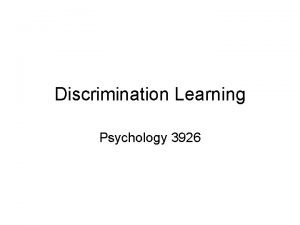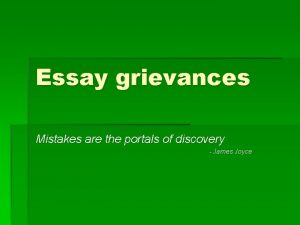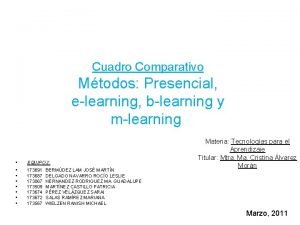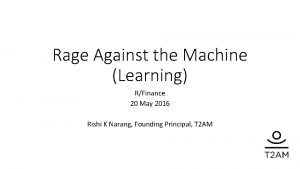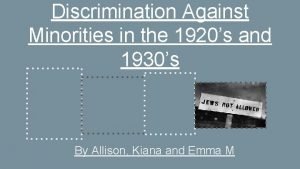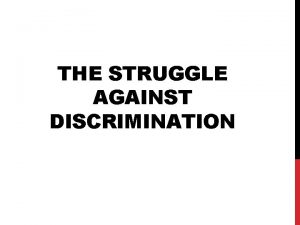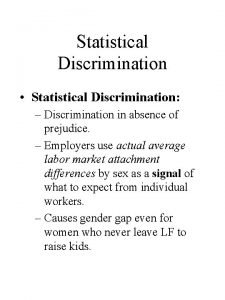Learning to Disagree Project Discrimination against Minorities The

















- Slides: 17

Learning to Disagree Project Discrimination against Minorities: The case of the Wealth Tax in Turkey Variety of Viewpoints developed by Burcu Cingay

About the case of the Wealth Tax in Turkey All states around the world include minorities. They are sometimes considered as “different” people than the majority of the population because of their religion, ethnicity, language or nationality. Despite the United Nations Declaration on the Rights of Persons Belonging to National or Ethnic, Religious and Linguistic Minorities, these diverse groups of people have been facing discrimination, segregation, pressure, and violence in various states. These variety of viewpoints aim to analyse an example of state pressure on a minority, the oppression of non-Muslim population, mainly Greek-Christian, Armenian and Jewish minorities in Turkey during World War II. The state pressure in this case was applied via a law, called ‘Wealth Tax’ and it extensively discriminated against non-Muslim minorities. Analysing the case of the Wealth Tax and its discriminatory impacts will be useful as a comparison with the various state pressures against minorities in different countries and enable discussion about the complexities of nation-building, citizenship and human rights.

Part of a speech by the Prime Minister before the implementation of the Wealth Tax Speech by Şükrü Saraçoğlu, Turkish Prime Minister, who oversaw the implementation of the Wealth Tax in November 1942 Source: https: //en. wikipedia. org/wiki/File: Sukru_S aracoglu. jpg “We are Turks, we are Turkish, and we always remain Turkish nationalists … This law is also a revolutionary law. We face an opportunity to gain our economic independence. This law will get rid of the [non-Muslim] minority merchant class that dominates the market and it will put the Turkish market in the hands of the Turks. ” (August 1942)

Cartoon supporting the implementation of the Wealth Tax This cartoon, supporting the government’s position, justifies the Wealth Tax. During World War II, there was enormous inflation because there were material shortages such as food, textiles etc. as the government confiscated such materials for defence purposes. Yet the newspapers blamed the non-Muslims for hoarding food, textiles and other stuffs and selling them on the ‘black market’. Hence in the cartoon, the larger man represents Turkey’s minority groups. He is carrying a small load called “Wealth Tax. ” The smaller man, representing Turkey’s Muslim population, is carrying a heavy load called “high cost of living. ” The fat man says: “Do not complain, I am

Context Information This cartoon, supporting the government’s position, justifies the Wealth Tax. During World War II, there was enormous inflation because there were material shortages such as food, textiles etc. as the government confiscated such materials for defence purposes. Yet the newspapers blamed the non-Muslims for hoarding food, textiles and other stuffs and selling them on the ‘black market’. Hence in the cartoon, the larger man represents Turkey’s minority groups. He is carrying a small load called “Wealth Tax. ” The smaller man, representing Turkey’s Muslim population, is carrying a heavy load called “high cost of living. ” The fat man says: “Do not complain, I am sharing your load. ”

News excerpt supporting the labour camp penalty for not paying the Wealth Tax News about non-Muslims who could not pay their taxes within one month and were sent to Askale labour camp as a penalty. People who were sent to the labour camp were made to do hard work such as rail track building. In the headline of the news, it was written that: “Askale passengers dressed as if they are going on vacation in the Uludag Mountains. They wore golfing trousers and snow glasses. ” Source: Son Posta Newspaper, 28 January 1943

Cartoon supporting the implementation of the Wealth Tax This cartoon justifies sending minorities who cannot pay their wealth tax to the labour camp. The old man, called Bahor (a typical Armenian name) represents Turkey’s minority groups/wealth taxpayers. The engineer represents one of the Turkish officials in the labour camp. There is a conversation between the two of them in the camp while Bahor is working for construction of a wall. “The Engineer, on the left: “Well done Boharaçi, you arrange stones in line very successfully. ” Bohor, on the right: “Of course pasha, I was a hoarder in Istanbul. ”

Photograph showing auctions where the non. Muslim population had to sell their belongings to pay the Wealth Tax Located in the archives of the Milliyet newspaper. Photograph taken in 1942. [Public domain], via Wikimedia Commons As the Wealth Tax had to be paid in one month, and in cash with no exception, the non-Muslim population had to sell their belongings at very low prices in auctions in order to pay their taxes. Most of the non. Muslim population lost nearly all their property. Source: https: //upload. wikimedia. org/wikipedia/com mons/e/e 0/Vergisiauctions. png

Part of a speech by a non-Muslim forced to pay the Wealth“When Tax we were persecuted and oppressed in Spain [in the 15 th century], the Turkish nation [Ottoman Empire] opened its doors [to the Jews]. The ruling party [of the Turkish Republic], however, unfortunately began to create differences among citizens. … [The ruling party officials] demolished our houses, violated our clean/intimate feelings [the feelings of belonging and being a part of a nation as citizens] when they called us for service … because they forced us to dig the soil [in the labour camp] instead of giving us military training [since the state do not trust non-Muslims for military service]. ” Source: http: //www. salom. com. tr/haber 108286 soyadlarimiz_mitrani_adato_ve_kovos. htm l Source: Rıfat N. Bali, Devlet’in Yahudileri ve “Öteki” Yahudi, İletişim Yayınları, İstanbul, 2004, s. 59 -108 http: //www. rifatbali. com/images/stories/dokumanla r/varlik_vergisi_tartismalari. pdf

Part of an interview with a non-Muslim whose family was forced to pay the Wealth Tax “At that time some people (minorities) were asked to pay heavy taxes, hundreds of times more than they could afford. For example, my husband’s uncle was a very showy person who worked in the Grand Bazaar. They thought he was very rich, and they wanted money that he never had. For this reason, he had to go to Askale, labour camp. My grandfather had to give up all his wealth, and moreover he had to borrow. So, he was not sent to Askale camp. This tax was totally arbitrary. ” Reference: Serhat Sarısözen. Sputniknews. 27. 08. 2018. Web. 31. 01. 2019

Context information Sosi Antikacioglu is an Armenian Turkish citizen who graduated from the Comparative Literature Department of Robert College and received her Ph. D. from Boğaziçi University. She has been a faculty member at Boğaziçi University Western Languages and Literature since 1977. She wrote a book of her family history starting from 1915. She narrated her father’s and mother’s lives, as well as her life as a non-Muslim woman, in her book.

Memory of a non-Muslim who was sent to the labour camp as a penalty for not paying the Wealth Tax “I was born in Istanbul and went to school in Istanbul. Then I became a merchant, selling cheese, registered at the Turkish Chamber of Commerce. My shop was in Eminonu, in the centre of Istanbul, and my dad helped me in the shop. In January 1943, a total of 105 000 Turkish lira Wealth Tax was levied to us. We had to sell our house for just 2000 lira to a Turk that we had known before. But the tax was very heavy, and we could not find enough money. Hence the police arrested my father in February 1943. He was 72 years old at that time and was deported to Aşkale labour camp. A month later, they arrested me. I was 32 years old. They transferred us by wagon to a station after several days; it was 8 hours’ walk from Aşkale Labour Camp. They forced us to clean the snow from the roads and to smash the ice from the railways. As food we had a poor-quality soldier’s meal and we had to be indebted 70 lira a day for this meal. A month after my father's death, I fled the camp and after a very adventurous trip I arrived in Istanbul without food and water. After a while persecutions were stopped and the other exiles returned home. My life was not normalised for many years after this disaster. ”

Context information Yeorgiu Topaloglu, author of this memory, was a Greek Turkish citizen who was sent to Askale Labour camp. This is a part of his memories about Wealth Tax.

Excerpt from a book written by a government official who was in charge of applying the Wealth Tax and who iss critical of the process “The Ministry of Finance had a secret request before the implementation of the Wealth Tax. Documents should be prepared in order to tax the unjust war-time profits earned through black market sales. But these documents should mention specifically the ethnicity/religion of the people who were to pay the tax. Hence Muslims should be coded with letter M. , non-Muslims with letter G. , converted Muslim (whose families were non-Muslims) with letter D. and foreigners with letter E. ” Source: Okte, Faik. Varlık Vergisi Faciası. 1951. Print.

Context information Book Title: ‘The Tragedy of Wealth Tax’ Book written by a government official, Faik Ökte, who was in charge of applying the law of the Wealth Tax. Faik Okte started to work as a Chief Inspector at the Government Financial Office in Istanbul on September 1942 and was one of the implementers of the Wealth Tax. He wrote a book titled “The Tragedy of Wealth Tax” in 1951. The excerpts below were summarised from his book.

Excerpt from a book written by a government official who was in charge of applying the Wealth Tax and who defends the process “Turkey tried to take radical measures since we did not want to enter World War II. Because of such radical measures, government had to take tax from wealthy people. About taxation, there was no distinction between Turks, non-Muslims and foreigners. The tax levied was not heavy. The forced labour process that was applied to people who did not pay the tax was not heavy. The taxation measures implemented in Turkey were really a small issue if it is compared to mass murders and exiles in the most civilised Western countries” Source: Kayra, Cahit. Savaş Türkiye Varlık Vergisi. 2011. Print.

Context information Book Title: ‘War, Turkey and Wealth Tax’ Book written by government official, Cahit Kayra who was a young government financial officer during the implementation of the Wealth Tax. Cahit Kayra was born in 1917, he is an author and statesman. He worked as the youngest inspector in Financial Office during the implementation of the Wealth Tax. Then he entered politics and became a deputy during the 1970 s. When he retired he wrote a book about the Wealth Tax. This excerpt is from the last part of his book.
 Discrimination learning psychology
Discrimination learning psychology You are what you eat do you agree or disagree
You are what you eat do you agree or disagree Dare to disagree socrates
Dare to disagree socrates Mistakes are the portals of discovery explanation
Mistakes are the portals of discovery explanation Partly agree
Partly agree Agree disagree line
Agree disagree line Why historians disagree
Why historians disagree Agree disagree
Agree disagree Do you agree or disagree with the statement
Do you agree or disagree with the statement Do you agree or disagree with the statement
Do you agree or disagree with the statement Loyal retainers archetype
Loyal retainers archetype Cuadro comparativo de e-learning
Cuadro comparativo de e-learning Rage against the machine learning
Rage against the machine learning Hát kết hợp bộ gõ cơ thể
Hát kết hợp bộ gõ cơ thể Slidetodoc
Slidetodoc Bổ thể
Bổ thể Tỉ lệ cơ thể trẻ em
Tỉ lệ cơ thể trẻ em Gấu đi như thế nào
Gấu đi như thế nào
